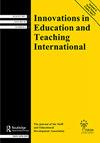Health professional education post-COVID: Tips and scholarly learnings
IF 4.9
4区 教育学
Q2 EDUCATION & EDUCATIONAL RESEARCH
Innovations in Education and Teaching International
Pub Date : 2023-11-09
DOI:10.1080/14703297.2023.2280233
引用次数: 0
Abstract
ABSTRACTHealth professional education (HPE) has been affected significantly by the COVID-19 pandemic, due to a combination of disruption to healthcare systems, changes to workforce needs, the effects on tertiary education provision and a necessity to innovate. While a challenging time, these were also opportunities in disguise. There is evidence that HPE is historically slow to adapt at the best of times; COVID-19 was an unavoidable catalyst for change. As the world tries to adapt to ‘COVID-19 normal’ life, it is essential that those in HPE consider what a ‘COVID-19 normal’ response might be. The learnings noted in this paper draw on recent literature and aim to help health professional educators consider what we have learned from our experiences during the height of the pandemic and ways of advancing curricula, teaching and learning. While the learnings are drawn from the health professions, they likely have relevance to professional and higher education more broadly.KEYWORDS: COVID-19competenciescurriculumhealth professional educationhigher educationpandemic AcknowledgmentsThank you to Ingrid Scholten for acting as a critical friend and providing encouragement and valuable suggestions.Disclosure statementNo potential conflict of interest was reported by the author(s).Additional informationNotes on contributorsSarah BarradellSarah Barradell, PhD, is a Senior Lecturer at Swinburne University. Her interests include curriculum development, stewardship, staff-student partnerships and health professional education research.新冠肺炎后的卫生专业教育:提示和学术学习
由于医疗保健系统的中断、劳动力需求的变化、高等教育提供的影响以及创新的必要性,卫生专业教育(HPE)受到了COVID-19大流行的重大影响。虽然这是一个充满挑战的时期,但这些也是变相的机遇。有证据表明,即便在形势最好的时候,惠普的适应速度也一直很慢;COVID-19是不可避免的变革催化剂。随着世界努力适应“COVID-19正常”的生活,惠普的员工必须考虑“COVID-19正常”的反应可能是什么。本文中提到的经验借鉴了最近的文献,目的是帮助卫生专业教育工作者考虑我们从大流行高峰期的经验中学到的东西,以及推进课程、教学和学习的方法。虽然这些知识来自卫生专业,但它们可能与更广泛的专业和高等教育有关。关键词:covid -19能力课程卫生专业教育高等教育大流行致谢感谢英格丽·斯科尔滕作为一位重要的朋友,为您提供了鼓励和宝贵的建议。披露声明作者未报告潜在的利益冲突。作者简介:sarah Barradell博士是斯威本大学的高级讲师。她的兴趣包括课程开发、管理、师生伙伴关系和卫生专业教育研究。
本文章由计算机程序翻译,如有差异,请以英文原文为准。
求助全文
约1分钟内获得全文
求助全文
来源期刊

Innovations in Education and Teaching International
EDUCATION & EDUCATIONAL RESEARCH-
CiteScore
4.80
自引率
5.60%
发文量
68
期刊介绍:
Innovations in Education and Teaching International (IETI), is the journal of the Staff and Educational Development Association (SEDA) www.seda.ac.uk. As such, contributions to the Journal should reflect SEDA"s aim to promote innovation and good practice in higher education through staff and educational development and subject-related practices. Contributions are welcomed on any aspect of promoting and supporting educational change in higher and other post-school education, with an emphasis on research, experience, scholarship and evaluation, rather than mere description of practice.
 求助内容:
求助内容: 应助结果提醒方式:
应助结果提醒方式:


